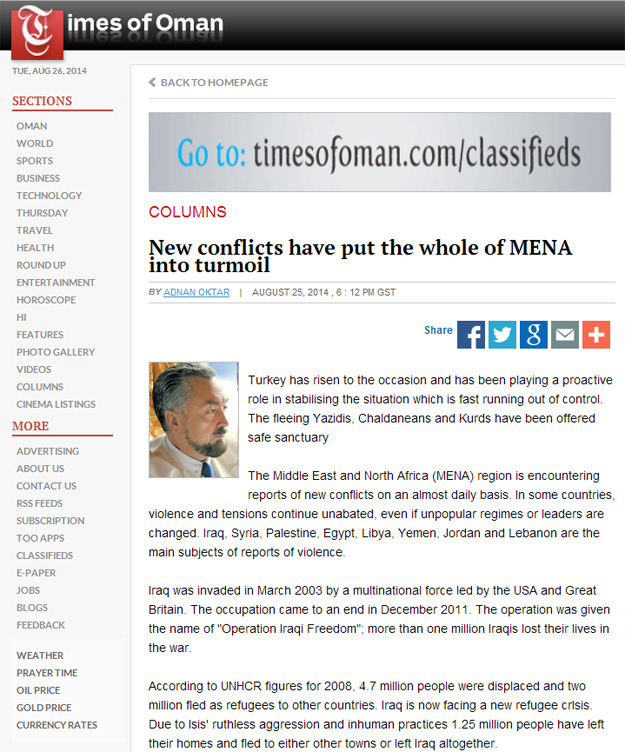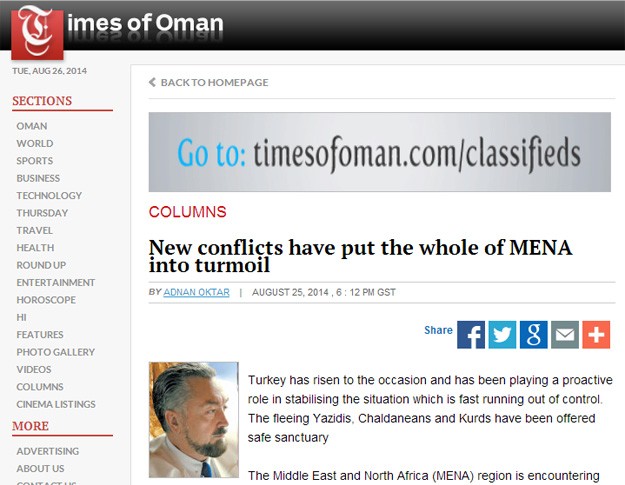
Turkey has risen to the occasion and has been playing a proactive role in stabilising the situation which is fast running out of control. The fleeing Yazidis, Chaldaneans and Kurds have been offered safe sanctuary
The Middle East and North Africa (MENA) region is encountering reports of new conflicts on an almost daily basis. In some countries, violence and tensions continue unabated, even if unpopular regimes or leaders are changed. Iraq, Syria, Palestine, Egypt, Libya, Yemen, Jordan and Lebanon are the main subjects of reports of violence.
Iraq was invaded in March 2003 by a multinational force led by the USA and Great Britain. The occupation came to an end in December 2011. The operation was given the name of "Operation Iraqi Freedom"; more than one million Iraqis lost their lives in the war.
According to UNHCR figures for 2008, 4.7 million people were displaced and two million fled as refugees to other countries. Iraq is now facing a new refugee crIsis. Due to Isis' ruthless aggression and inhuman practices 1.25 million people have left their homes and fled to either other towns or left Iraq altogether.
It should be obvious that societies cannot achieve democracy or gain their freedom by violence. Violence begets violence and hatred magnifies hatred.
Under its new name of IS, Isis has expanded its ambition of founding a Sharia state or caliphate stretching from Damascus to Baghdad. Their newly published maps show that it has added all Islamic countries to that ambition; they are therefore in a position to threaten all countries in the MENA region. Their appalling cruelty and horrific violence against the peoples of the regions they capture have led to wholesale panic in Syria and Iraq.
The organisation has captured oil producing regions such as Raqqa and Dayr az-Zawr in Syria, has been fighting the Lebanese Army at Arsal on the Lebanese border in the south and is fighting to capture Aleppo and the surrounding area to the north in an attempt to get to the Mediterranean.
On the one hand the organisation is threatening Lebanon, while on the other it is engaged in clashes with Jordanian security forces at Turaybil, the border crossing between Iraq and Jordan. Jordan too is seriously threatened.
Isis is still trying to capture a number of towns in Iraq that it regards as strategically important and still represents a major threat. These attacks are, of course, of serious concern to Turkey.
Mosul, Tal Afar and Tuzhurmatu, close to Salahaddin, regions with large Turkmen populations, have all suffered from these attacks. Hundreds of Turkmens have been martyred and thousands have fallen into the hands of the organisation. Hundreds of thousands of Turkmens, Arabs and Kurds living in these areas have already been forced to abandon their homes; those who remain are suffering greatly under IS' extremely repressive policies.
Some 300,000 Alawite-Bektashi Shabaks with close ties with Turkey have also been subjected to these attacks.
In addition, 48 people at the Turkish Consulate in Mosul were taken hostage by Isis and is trying to capture the Tomb of Shah Suleyman, which is located inside Turkish sovereign territory.
Turkey has risen to the occasion and has been playing a proactive role in stabilising the situation which is fast running out of control. The fleeing Yazidis, Chaldaneans and Kurds have been offered safe sanctuary. The lack of affection, love and compassion on the part of administrations in the MENA region, Iraq being foremost, is one of the primary exacerbating factors behind the tensions in the region. A concept of government that distrusts — if not openly despises — the people it claims to serve and seeks to keep them under control through oppression and violence continues to damage people's trust in regimes.
When existing occupations and fighting are added to this lack of love, the result is endless conflict.
The Middle East must therefore embrace its peoples with policies of love and adopt a concept of politics that seeks to attain the highest level of democracy.
Adnan Oktar's piece on Times of Oman:


